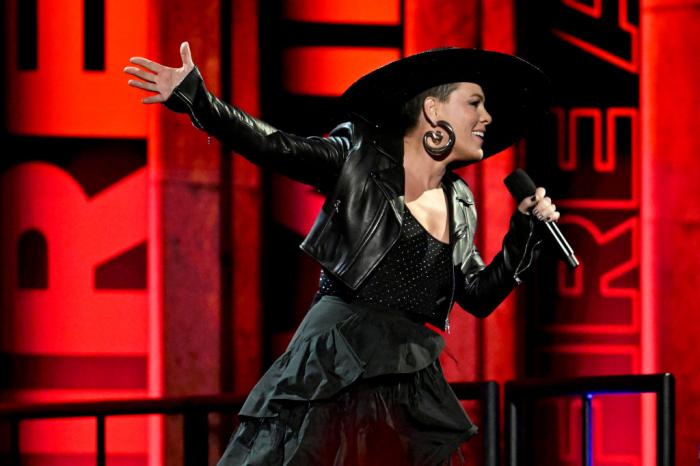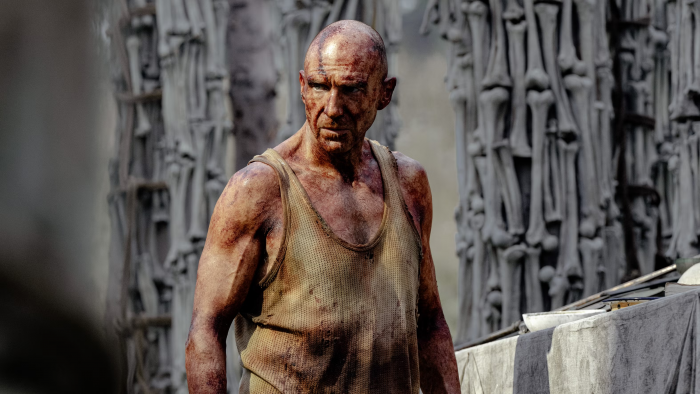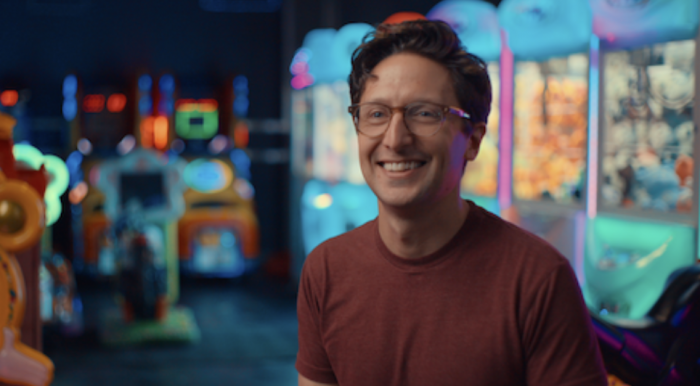
'American Symphony' Is an All-Timer of a Love Story
By Dustin Rowles | Film | December 1, 2023

When my teenage kid was diagnosed with AML cancer in 2021, one of the things I’d do during long days in the hospital while he was asleep was Google around and find other people’s AML stories. I remember, for instance, reading interviews of Evan Handler from Sex and the City and how angry he was about being diagnosed with AML in his 20s and wishing my son would be angry about it, too. Anger is easier to cope with than fear.
Then there’s Suleika Jaouad, diagnosed with AML at the age of 22 and given only a 35 percent chance of survival. She not only made it through the bone marrow transplant but had a NYTimes column, “Life Interrupted,” about her experiences, and a memoir she wrote, Between Two Kingdoms, released the month before my son was diagnosed with the exact same cancer. I couldn’t bring myself to read the book while we were in the thick of things — I still can’t — but I followed Jaouad online religiously. She is a brilliant woman who survived a terrifying ordeal and used her experience to inspire others and continues to do so.
She’s also the reason I can’t sleep, the reason I still spend too much of my life feeling panicked and anxious. The prognosis for patients with AML improves 100 days after the bone marrow transplant and continues to improve each day after. Most relapses occur within the first two years, so if a patient makes it past the year mark and then the two-year mark, there should be, at least, a small sense of relief. Patients are never technically “cured” of AML, but after five years, the odds of relapse are so low that doctors all but consider a patient “cured.”
Suleika Jaouad relapsed a decade after her first diagnosis, only a few months after the memoir she wrote about surviving AML was released. She is the reason — 26 months after my son’s bone marrow transplant — that my stomach falls to the floor if my son scratches his leg, the reason I fall into a state of despair if my son eats only half his breakfast, the reason I have to lie down and stare at the ceiling for half an hour if my son takes a nap in the middle of a Saturday afternoon, nevermind that it’s dry-skin season, that the bone marrow transplant has forever robbed him of his appetite, or that every 16-year-old probably takes the occasional weekend nap.
The only thing worse than an AML diagnosis is relapse, and that nightmare situation is never far from my mind. I often remember ahead of Jaouad’s second bone marrow transplant, she said something like, “The good news is, I’ve already gone through this so I know what to expect. The bad news is, I know what to expect.”
A bone marrow transplant is a procedure where doctors try to bring a patient as close to death as possible without killing them. That’s almost literally what it is: Doctors try and find that line with chemotherapy between killing every cancer cell in your blood and not permanently damaging organs. If the chemo is too harsh, your heart might give out. If it’s not harsh enough, the cancer may come right back. Things will go wrong, and in the days, weeks, and months after a bone marrow transplant, doctors troubleshoot those medical issues, whether it’s infection, lung damage (as happened to my son), blindness, amputations, or worse.
This is the hell that Suleika Jaouad went through — again — while her husband, Jon Batiste, had the best year of his career. Suleika went through her first chemo treatment the day that Batiste was nominated for 11 Grammy nominations. The day that Batiste won five Grammys, including Record of the Year, Suleika had to take an ambulance ride to be readmitted to the hospital. Jaouad and Batiste got married the day before her transplant, and had one of the best days of their lives, but before going to bed, Jon shaved Suleika’s hair.
Their documentary is about how they navigated a year that culminated in Batiste leaving Stephen Colbert’s The Late Show, where he was the bandleader, and performing his long-awaited “American Symphony,” a stirring and brilliant concert, his magnum opus, which he played for one night in Carnegie Hall. Suleika Jaouad was in attendance.
It’s a touching, intimate documentary about music, expression, creativity, and about making space for and holding conflicting emotions. They did not use her cancer as an excuse to give up on life; they used it to inspire their creativity. They used the will to survive as fuel to keep them both going — “Survival is its own creative act,” Suleika says — which doesn’t mean relentlessly upbeat attitudes. It did not mean ignoring reality. No moment did I relate to more in the documentary than the one in which Batiste is curled up on his bed, underneath his pillow, talking on his phone, and trying to get through a panic attack.
I cried a lot while watching American Symphony, but I would. It brought back a lot of memories and feelings. Surprisingly, it did not elicit any anxiety, and not just because I knew how it would end, but because Suleika and Jon felt like a couple who knew how to get through it together. I felt confident in their ability to navigate both Grammy nominations and life-endangering cancer. They radiate life and warmth and love.
You will cry a lot, too, but for different reasons: Because American Symphony is a real love story, not about first kisses, weddings, first homes, and gender-reveal parties, but about surviving together, about going through the best days and the worst days of their lives at the exact same time.
When my son was going through it, I could not bring myself to say to him, “It’ll be OK,” because I honestly didn’t know if it would be OK, and if it wasn’t OK, if he died, I didn’t want my son to be mad at me for lying to him. I had this horrible, horrible vision that my son’s last words would be, “You promised me it would be OK!”
Something Batiste says in the documentary made me think that I’d do it differently if it happened again, god forbid. “You have to confront the brutal facts of the reality that you might not pull it off,” he said. “But at the same time, have unwavering faith. Completely unwavering faith. And you have to do both at the same time.”
The brutal reality of it notwithstanding, it’s not a lie if you have unwavering faith that it’s true.
May your second remission last for another 50 years, Suleika. American Symphony — from director Matthew Heineman and producers Michelle and Barack Obama — is currently streaming on Netflix.



